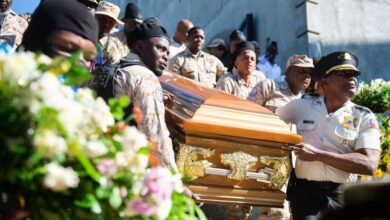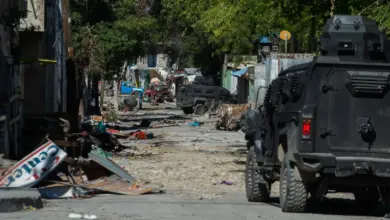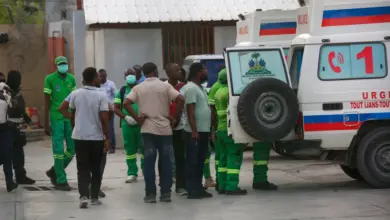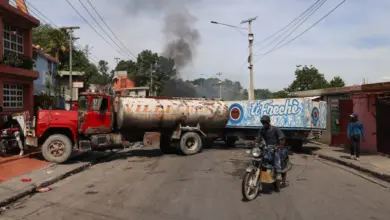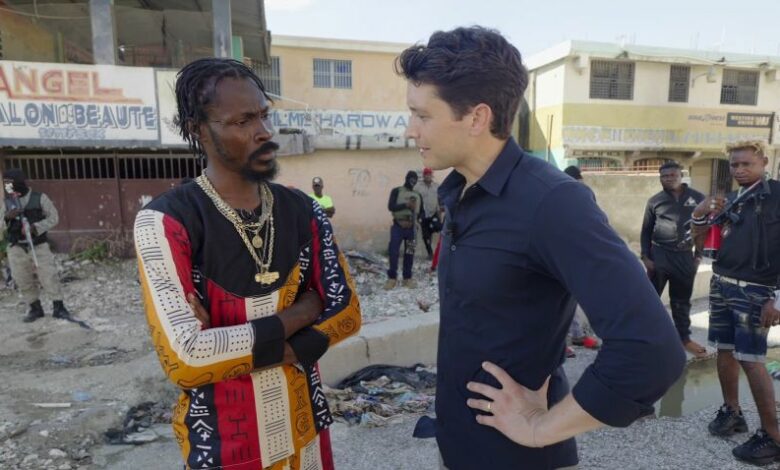
Vitel’homme Innocent’s picture on the FBI’s “Ten Most Wanted” list of fugitives suggests a crazed man – eyes wide and wild, teeth bared. It’s the photo you might expect for a gang leader accused of destabilizing a nation, who claims to be under divine protection and who has a $2 million bounty on his head for alleged kidnappings.
In person, he projects a different image, at least to guests. Powerful, yes, surrounded by armed acolytes who jump at his glance – but also carefully solicitous, with a cooler full of sandwiches for his visitors, and a tendency to wax philosophical in conversation.
After weeks of negotiations, CNN entered Haiti’s gangland earlier this month to speak with Innocent, whose armed group Kraze Baryé is among the allied armed groups that have plunged Haiti into a crisis of lawlessness. He is an influential voice among the country’s gang leadership, and one who believes that peace must be restored. But under what conditions?
On the edge of the Tabarre district of Haiti’s capital Port-au-Prince last week, a truck led us through a warren of twisting dirt roads, passing checkpoints manned by armed guards in balaclavas and Halloween masks. We bumped through what was once a well-heeled neighborhood; pink bougainvillea still spilled over high walls and a green soccer field opened onto glorious views of the city below.
Now, it is almost a ghost town. Cars and motorbikes began to follow our car, their drivers masked, long guns poking out the windows. Some vehicles bore the fluttering red and blue Haitian flags of a ragtag diplomatic convoy.
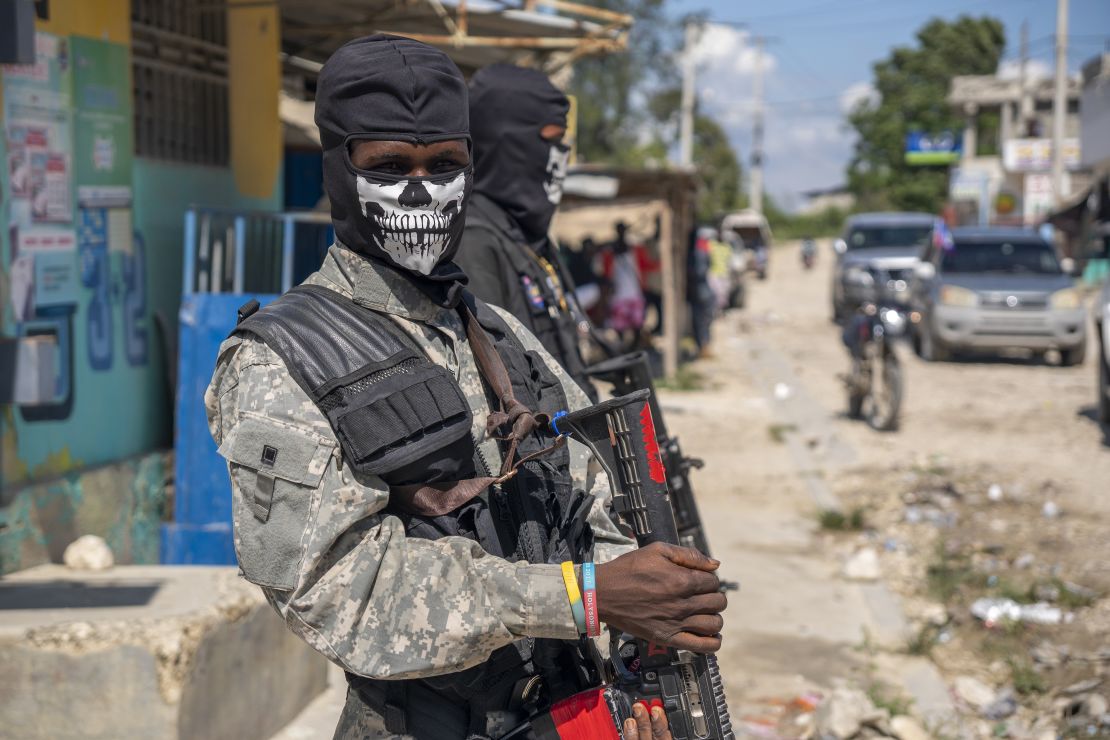
After about 45 minutes, a gold car pulled in front and stopped. Innocent himself stepped out. He was slight and apparently unarmed, dressed in a bright striped batik suit and soft loafers, with a tangle of gold chains and a cross draped round his neck. He led the way into a rococo mansion, where elaborate gold velvet chairs and settees, crystal in display cases and arrangements of plastic flowers hinted at previous owners.
We sat, removing stuffed teddy bears from the seats to make room, and talked about the future.
“The Haiti we had, Haiti, the pearl of the Antilles that we grew up in, could still return to being the most beautiful,” Innocent said, speaking mildly in Haitian Creole. “One day, someone could sit in Champ de Mars and have an ice cream.”
Today, the capital’s iconic Champ de Mars park is a war zone between gangs and police. After years of political turmoil, institutional neglect and a series of brutal natural disasters, Haiti’s ill-fortune was pushed to its nadir last month with an unprecedented wave of gang violence that has effectively shut down Port-au-Prince.
The city’s main seaport and airport are dark. Government ministries have been taken over by refugees fleeing gang attacks. Bodies lie among uncollected trash in the streets and the neighborhoods still free of gang control have seen the rise of fear-filled vigilantes, who kill and burn suspicious outsiders.
Signs of the city’s dysfunction were evident within the Kraze Baryé stronghold. Inside Innocent’s sprawling house, the air was still and hot; his foot soldiers labored to get a generator running to power air-conditioning or a fan. No one had bothered to remove the wrecked sedan that still sat next to the pool, with its blown-out windows and four flat tires.
But the man on the gold sofa preferred to talk about a brighter future – one that he claims Haiti’s gangs are prepared to usher in.
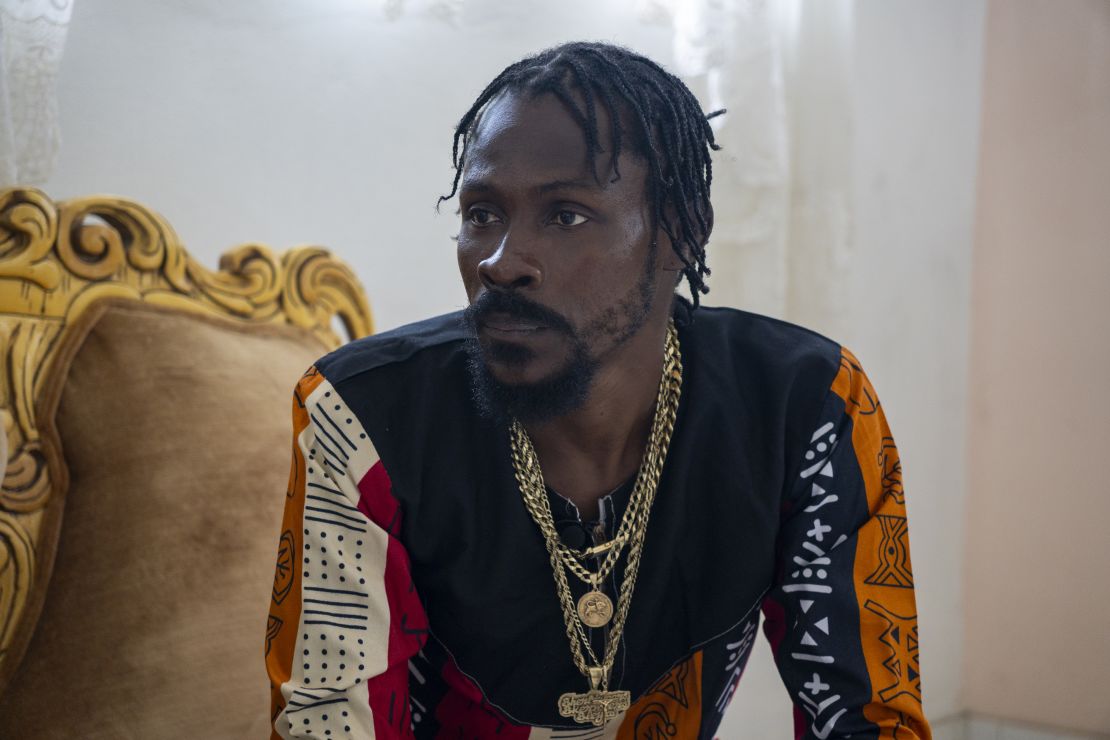
To sit down with one of Haiti’s gang leaders is controversial in the country, given the suffering and terror that armed groups have long sown. Arson and collective rape are preferred gang tactics to subjugate civilians, experts say, and the United Nations has recorded the gang-linked killings of least 1,660 people and kidnappings of at least 438 people – including 21 children – in the first 90 days of the year alone.
Innocent himself is under sanction by the United Nations for extensive human rights abuses committed by Kraze Baryé under his leadership, and is wanted by the Haitian National Police for kidnapping for ransom, murder, rape, armed rape, vehicle theft, theft and destruction of property. His group is known to target the Haitian National Police directly, and has sought to seize some of the wealthiest neighborhoods of Port-au-Prince.
In his first interview with foreign press, Innocent did not deny the deaths, the arson, the rape or the kidnappings committed by the city’s allied gangs, and told CNN that he has made some mistakes. But he framed the recent months of deadly street violence as collateral damage. Deaths, both accidental and extrajudicial, have also been caused by the police, he points outs, claiming they refuse to engage in dialogue.
His only regret, he said, is getting involved with politics.
The gangs and the oligarchs
Innocent, 37, portrays the broad alliance of gangs attacking Haiti’s institutions as a progressive venture. “Our dream is to get rid of the oligarchs who prevent the country from progressing,” he said of the gang coalition that calls itself Viv Ansanm or “Live Together.”
In February, Viv Ansanm launched an unprecedented assault on the Haitian state, attacking police stations, prisons, government buildings, hospitals, the national palace, the national library, cargo ships, and the public electricity company. Their attacks coincided with a visit by then-Prime Minister Ariel Henry to Nairobi for talks about Kenya leading a multinational security force to bolster Haiti’s National Police.
Henry eventually resigned, as Viv Ansanm demanded – but Innocent says the gangs now oppose the transitional governing council created to replace him.
Innocent’s solution: “Sit and listen to Viv Ansanm.”
Then, he suggested, “there will be a resolution as soon as possible.”
He criticizes the governing council as more of the same, and says it’s time for the old political elites to go – a view held by many in Haiti. But the gangs have long had a symbiotic relationship with the nation’s rulers, who used armed groups to exert pressure on rivals through kidnapping and other attacks.
The relationship continues today – though Haiti’s gangs are increasingly acting independently to amass money and power, according to experts,
“Yes, I have an armed group. I direct them,” Innocent said, when asked about Kraze Baryé’s involvement in kidnapping. “But when you really think about it, would these guys really have any clue who to kidnap and who not to kidnap? Not at all.”
“It’s really the same people sitting with (regional organization) CARICOM to represent the country. If you choose to block them, they’ll call us and say: ‘I have such and such a job… Fix it for us.’ And then you hear so-and-so has been kidnapped. Or so-and-so has been taken hostage,” he says.
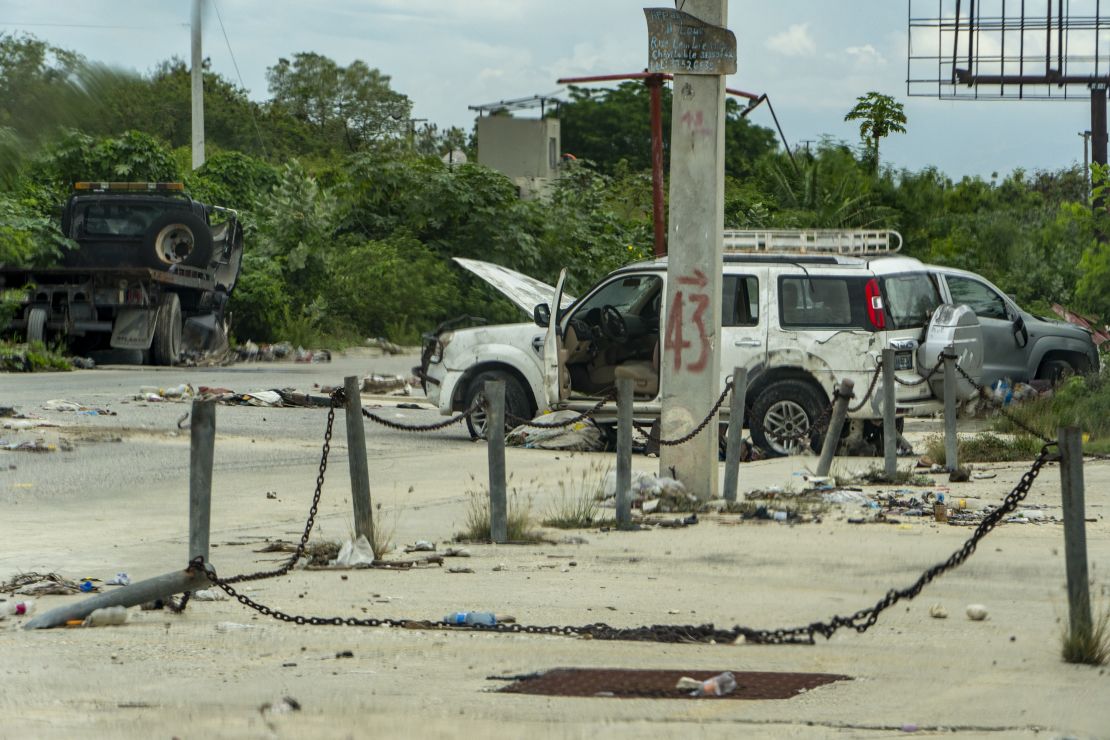
It’s the corrupt officials who funnel arms and ammunition to gangs today, he said.
“Let’s take a clear example. We aren’t able to travel. We aren’t able to import. We aren’t able to export. Yet there are always weapons coming in. There are always bullets. And we don’t have any representatives at the border. We don’t have any representatives at customs. Yet all these materials go through exactly these channels. How do they get to us?” he says.
The corruption he describes is no secret. Haiti currently ranks 172 out of 180 countries on the World Corruption Perceptions Index. Over the past year, sanctions by Canada and United States have accused former prime ministers and presidents in Haiti – among dozens of other influential Haitians – of corruption and financing the country’s gangs, among other crimes.
Leading CNN through his territory, Innocent said he remembers local elders farming in Tabarre during his youth in the 1980s and 90s. “Of course, we were able to harvest then,” he recalls. Today, he blames Haiti’s dependence on imported food as yet another sign of how the country has been mismanaged by upper class, robbing ordinary people of every economic opportunity.
Before he took up arms, he claims, his own legitimate businesses, including a construction business, a hotel and rental car enterprise, were destroyed by powerful business interests in the area.
‘Why attack ordinary people if you’re trying to stand up for the people?’
Marie-Lucie Bonhomme Opont, 55, a well-known radio and television journalist who once lived in Tabarre, has a different view of what transformed the neighborhood to the desolate place it is today.
She was robbed by Kraze Baryé members in June last year, she says, then kidnapped and brought to meet Innocent himself. “It was the middle of the night, and I was sleeping, when suddenly I heard a tremendous commotion downstairs,” she recalls. “Around 30 armed people broke into my house and began to pillage it, taking things, even food from the kitchen.”
The burglars demanded money, and then, apparently unsatisfied, took her away with them. They drove for about 45 minutes, according to Opont.
“I was so scared, bandits coming into my house. Shocked that this could happen in my own home. I know they are rapists, they have committed atrocious rapes and other crimes,” she says.
Eventually they came to a stop in the dark. Opont tells CNN that Innocent himself then came to her car and asked her if she recognized his voice. “Of course I did,” she says. “He used to give press conferences and was very active on social media.”
He seemed to recognize her too, addressing Opont by name. “Of course he knew who I was,” she says. “Everyone in the neighborhood knows that’s our house. But why they took me, I don’t know. I still ask myself.” She was released early the next morning without explanation.
Her husband, kidnapped a week later, was not treated as well. Held by force for several days without his medication, Pierre-Louis Opont was released by Kraze Baryé only after they extracted a heavy ransom payment from his family, she says.
They moved out of Tabarre immediately. “It’s what we call in Haiti a territoire perdue,” she says of her old neighborhood – a lost territory.
“It’s a red zone,” Opont elaborates. “A few days after my husband’s kidnapping, gang members installed themselves in a house near the main road and were firing at passing vehicles.”
She has no patience for gang leaders’ claim to be fighting to liberate Haiti.
“Why attack ordinary people if you’re trying to stand up for the people?” she asks. “The whole neighborhood is being constantly terrorized by armed bandits. How can the gangs say they work for the good of the country when they also commit kidnappings, when so many women have been the victims of brutal rape?”
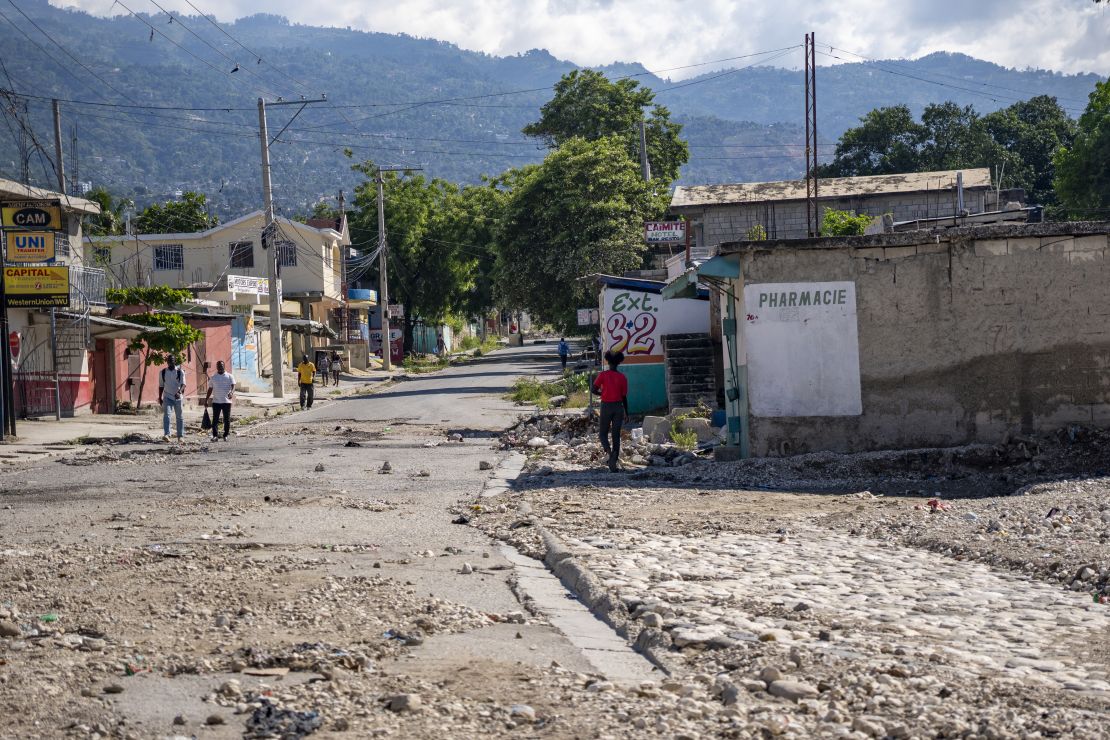
‘Predator and protector’
Several of Innocent’s peers have established public personas through the press and social media. Ex-police officer Jimmy Chérizier, known as Barbeque, styles himself as a Robin Hood-type figure. Izo, of the “Five Second” gang which operates near the country’s main port, is also a musician, who shares music videos online. And Lanmo Sanjou, leader of the 400 Mawozo (400 Idiots), was recently pictured smoking cigars with a social media influencer.
While they are allies, sometimes meeting by video conference, the Viv Ansanm alliance doesn’t necessarily mean friendship. Escorting CNN to the edge of his territory, Innocent showed us a broad riverbed and lush tree-lined landscape beyond. But he repeatedly warned that we should not linger long, as his troops fanned out in sneakers and flip-flops, a motley assortment of guns at the ready.
We would learn later that on the other side of the riverbed was the territory of 400 Mawozo, which has allegedly cooperated with Kraze Baryé on kidnappings and also tried to kill Innocent over a land dispute, according to two security experts in the country.
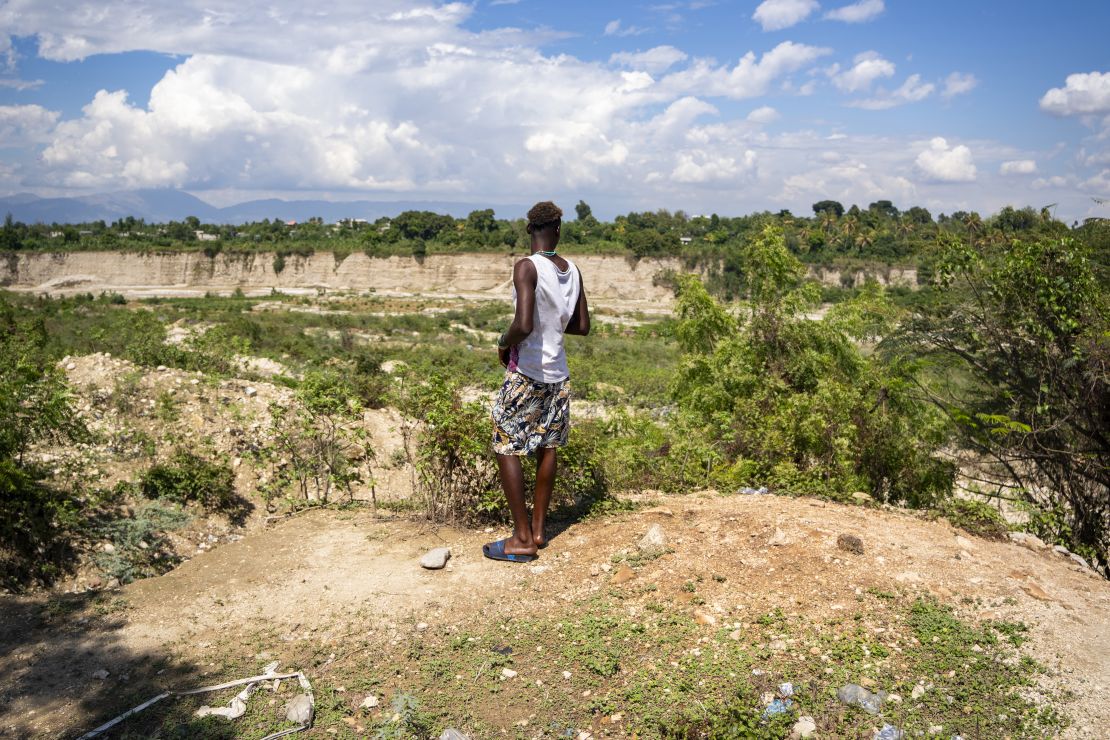
Elsewhere in his neighborhood, Innocent was keen to show his leadership in the local population – a posture that matches the “predator and protector” role that UN experts describe of Haitian gangsters, who function as local authorities while also extorting money from local businesses to make payroll.
Kraze Baryé employs around 100 men and women, according to Innocent’s lieutenant and cousin, the bleach-blond Dezod Augustin, 34. On the day that CNN visited, several gang members wore custom t-shirts with teddy bears on the front and lettering on the back that read “Tabarre Area Security Unit.”
Walking slowly down an unpaved street full of vendors, Innocent could have been any politician at a local meet and greet, stopping to massage the injured foot of an elderly market woman, and introducing CNN to two blind men that he had taken under his protection, blaming the Haitian state for failing to care for them.
But as a nighttime curfew approached, bottles of beer and liquor began to appear in the hands of our entourage. Innocent stopped our procession at a food stall on the side of the road, and ordered piles of stewed pork and fried plantains to share. The vendor, a middle-aged man, complied silently, showing no reaction to Innocent’s armed aides or the foreign visitors.
Rights experts in Haiti warn against taking displays of community leadership at face value.
“Gang leaders talk about liberation and representing the people in order to attract popular support,” cautions Gedeon Jean, a human rights analyst in Port-au-Prince who has tracked the rise in gang kidnappings for years.
“But all they want is more power and a state that accommodates their crime.”
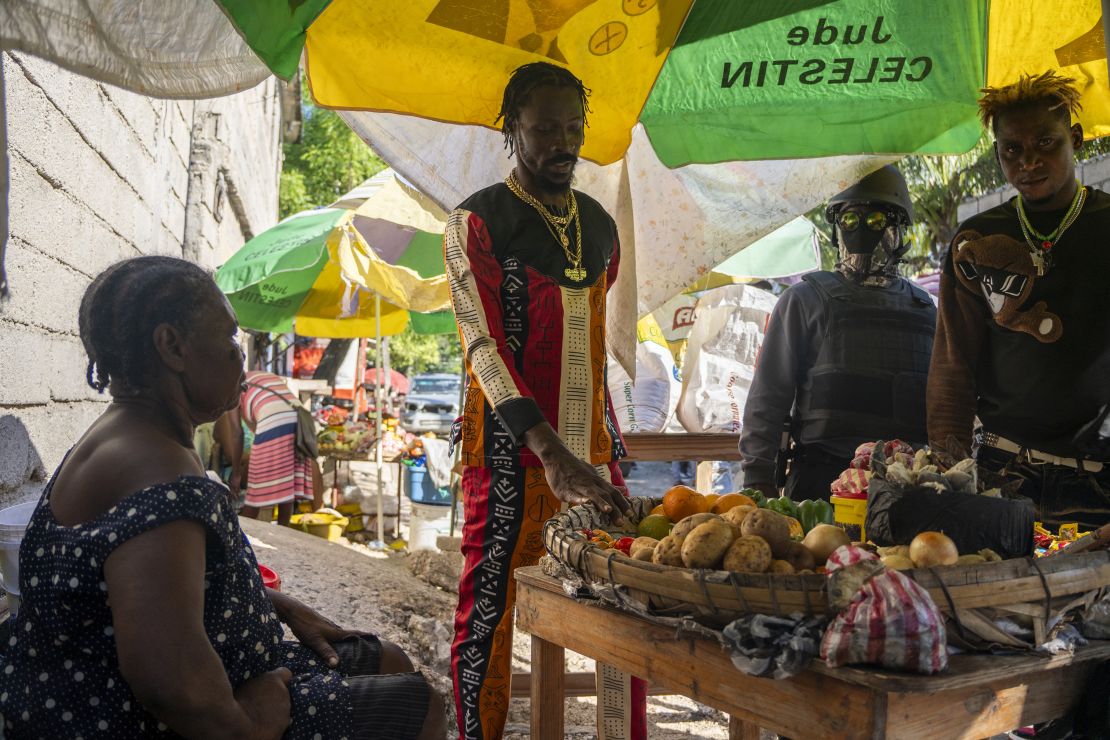
An American island in gangland
Less than a mile from all this is the US Embassy, soldiers positioned on its roof to constantly scan the scrubland surrounding it. Just last week, Kraze Baryé members attacked a nearby civilian neighborhood, driving about 150 people from their homes in the dark and shooting one man in the heart, according to an eyewitness.
As an island inside Innocent’s territory, the diplomatic complex is an inversion of Haiti’s relationship to the US itself; here, Kraze Baryé is the fearsome regional power, dominating neighborhoods Torcell, Tabarre and Delmas through which Americans must cross to reach their embassy.
This uneasy geography also means Innocent stands between the rest of Haiti’s gangs and Washington, whose capacity and appetite for military intervention in the country’s blood-soaked chaos are the subject of constant speculation in the country.
So far, the US has sought to sidestep any military entanglement in Haiti. Rather, Secretary of State Antony Blinken announced in March that the US would contribute $300 million to a multinational security support mission to the country. But so far, just $18 million has deposited into a UN-managed Trust Fund for the mission, with $8.7 million provided by Canada, 3.2 million provided by France and $6 million provided by the United States.
The Kenya-led mission, which would also include personnel from the Bahamas, Bangladesh, Barbados, Benin, Chad and Jamaica, is currently on hold due to concerns over Haiti’s political instability.
And despite – or perhaps because of – his “Most Wanted” status, Innocent seems interested in keeping Kraze Baryé’s relationship with the embassy neighborly. “It’s an honor when a country has its embassy in our vicinity, it’s because it wants to collaborate with us,” Innocent said.
Last month, dozens of helicopters conducted a series of emergency evacuation flights for US citizens, landing and lifting off next to the embassy building – a high-risk operation that would have been easy for any Kraze Baryé member to upend with a few rounds. But the flights came and went without incident.
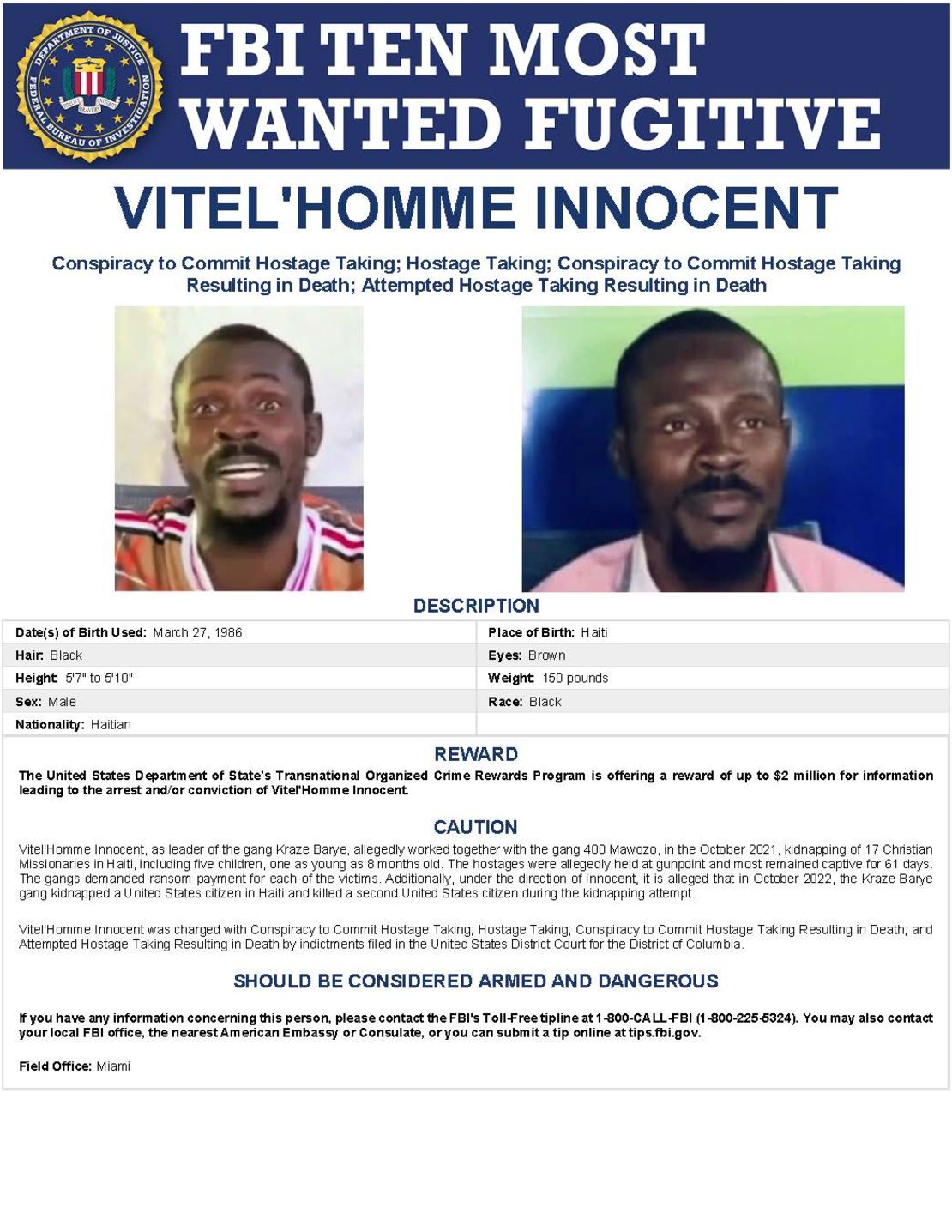
Innocent deflects when asked about allegations by US authorities that he was involved in the 2021 kidnapping of more than a dozen US and Canadian missionaries, including young children, who were held captive for weeks; and in a 2022 attack on the home of an elderly American couple which left a woman dead and saw her husband taken hostage for ransom before his eventual release.
Innocent says simply that the justice system has not given him the chance to answer the US allegations, but that he would be willing to defend himself in court.
“We believe in the law. We want to make the best choice, consult with legal counsel and do due process,” he says.
In Haiti, he says, he would be willing to face the justice system as long the corrupt elite do too. “We have to get rid of the oligarchs’ system, and we are ready too to answer the justice system of our country, so that we can see where the worst evil was hidden.”
The State Department did not respond to CNN’s requests for comment or to speak with US Ambassador to Haiti Dennis Hankins.
What it would take to lay down arms
For all their shows of force, the grip that Haiti’s gangs have is tenuous and their soldiers generally poorly disciplined and trained, experts say. Many longtime observers, including former US Ambassador Rick Barton, believe it would only take a small specialized fighting force – say, a few hundred Marines – to halt the entire crisis, and to create the right conditions for a larger multinational security mission to arrive and begin assisting Haiti’s police.
Haiti does now have a transitional government, sworn in on Thursday. Still to come are the tasks of appointing a new head of government and a cabinet; coordinating the arrival of a multinational security force to reclaim the capital; and eventually to hold long-overdue elections.
But Haiti’s gangs maintain they deserve a seat at the negotiating table. If they do not get it, Viv Ansanm will exercise its say by other means, Innocent warns.
“You will understand that when you realize that planes cannot fly. When you see that investors cannot come in. When you analyze that there are a bunch of foreigners who were already in the country with projects who were forced to flee to their countries to wait for stability,” he says.
Jean, the rights expert, says ex-Prime Minister Henry’s resignation in March at the urging of the international community was a huge mistake that set Innocent and others down an impossible path.
Henry’s resignation seemed to validate gangs’ claims that they are legitimate political actors; today, they feel they have not been given due credit, Jean says.
“They think: ‘We made Henry resign, so we should be involved in the political transition,’” he says. “But to give them that would only further validate them.”
Among their demands, the gangs want amnesty under any future government, Innocent says, and a plan for the future of the many young people currently following his orders – both issues that have also been raised by members of the governing council.
“When we drop our weapons, we must know that we have a state that will bring a framework for the future. Can I tell someone to drop his weapon and take a rock to eat? Not at all,” Innocent says.
Edited by CNN’s Rachel Clarke in Atlanta.

